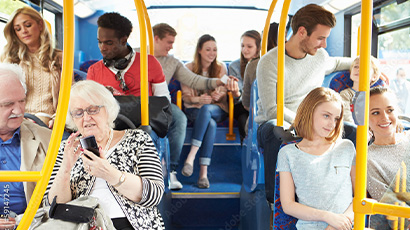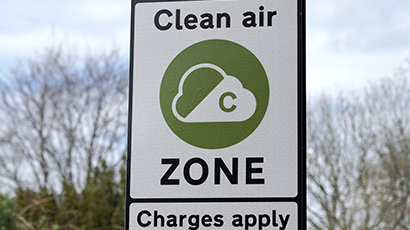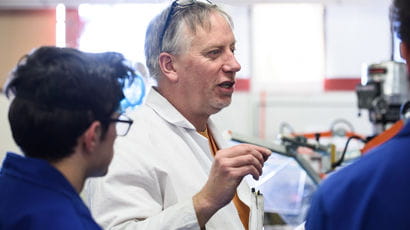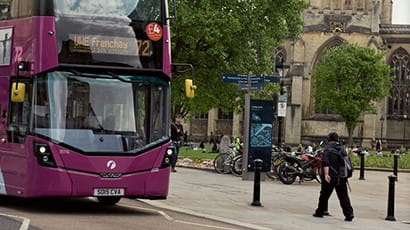One in 15 West of England residents use public e-scooters every month

University of the West of England (UWE Bristol) researchers have published the results of the West of England rental e-scooter trial.
E-scooters have become a common sight in Bath, Bristol and South Gloucestershire. The scheme launched in October 2020 and is one of 32 e-scooter trials permitted in England by the Government. With three times as many trips as any other scheme in England, the West of England scheme has been by far the largest in the country. The trial offered short and long-term e-scooter rental options to the public and has been operated by Voi Technology, with new operator Tier taking over the running of the scheme later this year.
UWE Bristol was commissioned by the West of England Combined Authority to conduct a comprehensive evaluation of the impacts of the scheme. The findings of that evaluation have informed the specification and award of the new rental scheme contract, which will also offer e-bikes and e-cargo-bikes.
The researchers used data from the trial operator about how people used the scooters alongside other data on collisions and injuries and how e-scooter riders interacted with other street users. Both users and non-users were interviewed about their experiences with e-scooters.
Kiron Chatterjee, Professor of Travel Behaviour at UWE Bristol, who led the study, said: “We found many people in the area have adopted e-scooters into their way of life. In February 2023, 64,000 different people were using rental e-scooters in Bath and North East Somerset, Bristol and South Gloucestershire each month, that’s the equivalent of 7 per cent, or 1 in 15 of residents of these areas.
“People are using them to get to work, college and university, as well as leisure and shopping. Users are predominantly younger adults with 85 per cent of all e-scooter trips made by 18-35 year olds.
“Younger users generally do not have a car and the scheme has made it easier for them to get around and provided access to destinations previously not possible. However, e-scooters are used far more by younger than older adults and by men than women, and it would be preferable for a shared system like this to be used more broadly across the population.
“The new contract starting this autumn will offer e-cycles as well as e-scooters and will be attractive to a wider demographic than current e-scooter users.”
The study assessed how the scheme is helping cut carbon emissions. John Parkin, Professor of Transport Engineering at UWE Bristol, explained: “We estimated that use of the rental e-scooters is leading to a net reduction in carbon dioxide emissions. The reduction makes a small contribution to the reduction we need to see in transport to meet net zero, but all reductions of any size are necessary. Reductions would be bigger if the scheme led to more car users switching to e-scooters.”
One concern is whether e-scooters are safely interacting with other road users. Dr Jonathan Flower, Senior Research Fellow at UWE Bristol, explained: “Observations at sites in Bristol showed a very high number of near-misses involving e-scooters and other road users, but this also applied to cyclists. That’s when an e-scooter or cyclist rode within a metre of a parked vehicle, or when a vehicle overtook a rider and left a gap of less than 1.5 metres. Some 95 per cent of near misses were with motor vehicles.
“The proportion of e-scooter riders and cyclists riding through red signals and riding on footways was similar to each other. But while 57 per cent of cyclists wore helmets, only nine per cent of scooter users did which may explain high injury rates from falls for e-scooter riders.”
Dr Flower added: “We found the lowest rates of pavement riding in places with separated cycle infrastructure. Good cycling infrastructure will meet the needs of both cyclists and e-scooter riders and will help increase the diversity of users. Creating good quality environments for both walking and riding should be a high priority.”
An important aspect of the study was to examine interactions between e-scooters and pedestrians.
Dr Tamara Bozovic, Research Fellow at UWE Bristol, said: “Walk-along interviews allowed us to gain a better understanding of pedestrian experiences. We found that rental e-scooters could cause stress, especially to disabled participants, and sometimes lead them not to visit places with high concentrations of e-scooters or even reduce how much they walk.
“We found that users generally felt safer around e-scooters than non-users, when walking in the city. Older and disabled people were more likely to experience diminished walking experiences due to e-scooters, including feeling less safe.
“These findings are important and timely - deciding whether and how to implement rental e-scooter schemes should be based on sound evidence on what they mean, for diverse groups of citizens, and their rights to the city.”
Reflecting on the study, Professor Chatterjee said: “Given the e-scooter trial in the West of England has been the largest in the UK, this evaluation is of national importance. Other scheme providers can learn from it.
“It shows e-scooters provide a valuable addition to the urban transport mix for many people, but it also highlights issues that need to be addressed.
“I am pleased to say that the West of England Combined Authority has taken account of the evaluation findings and the next phase of the trial will involve e-cycle hire as well as e-scooter hire and has provision to reduce adverse impacts on pedestrians through better management of parking.”
The full report has been published on the website of the West of England Combined Authority, which funded the evaluation.
Related news

09 June 2025
Opinion: If you want trams, support the buses
Graham Parkhurst, Professor of Sustainability, Centre for Transport and Society, reacts to news of £800 million investment in the region's transport network.

29 November 2024
Bristol Clean Air Zone – two years on, what is the future of the CAZ?
Two years on, Professor Graham Parkhurst and Professor Jo Barnes comment on what the future of Bristol's Clean Air Zone looks like.

20 June 2024
Academic elected as President of Chartered Institute of Highways and Transportation
Professor Glenn Lyons has been announced as the new President for 2024 / 25.

28 November 2023
New report finds lack of transport choices is leaving young people behind
A new study warns that young people cannot access life-defining opportunities due to poor transport provision.

01 October 2023
UWE Bristol wins funding to develop safer autonomous vehicles
UWE Bristol has secured government funding for research into autonomous vehicles.

14 June 2023
Researchers monitor autonomous bus user experience as UK's first zero emission service launches new route
Researchers monitor autonomous bus user experience as UK's first zero emission service launches new route.

31 May 2023
Enhanced junction designs “make it clear to drivers that they need to give way”
A research project has identified two side road crossing designs that encourage drivers to give way to people crossing and waiting to cross.

24 January 2023
UWE Bristol joins First Bus and partners to launch UK's first zero-emission autonomous bus service
The UK's first-ever zero emission autonomous bus service reached a key milestone with trials starting on public roads in Oxfordshire on Monday 23 January 2023.

17 January 2023
Panel poses key questions about future roads spending
Report published raising seven key questions to help guide for decision-makers achieve the best value from future roads spending.

28 July 2022
Unfair bus fares risk holding young people back
Research by UWE Bristol and transport charity Sustrans finds access to free and discounted bus fares for 16–24 year olds varies significantly across the UK.

19 August 2021
Study finds some road closures cause less congestion
A study from the University of the West of England (UWE Bristol) sheds new light on why traffic is sometimes reduced when certain city roads are closed.

13 May 2021
Funding granted for innovative clean air project to learn how Bristol travel changed during pandemic
Dr Fiona Crawford has been awarded funding for a new innovative clean air project looking at how car and van travel has changed across Bristol during different stages of the pandemic.
You may also be interested in

Media enquiries
Enquiries related to news releases and press and contacts for the media team.

Find an expert
Media contacts are invited to check out the vast range of subjects where UWE Bristol can offer up expert commentary.

Centre for Transport and Society (CTS)
More information about the Centre for Transport and Society, including research projects, transport courses, news, events and opportunities.






